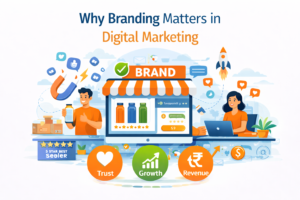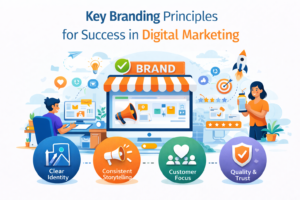In today’s competitive digital landscape, marketing without branding is like building a house without a foundation. You might drive traffic, generate clicks, and even run successful campaigns, but without a strong brand identity, your efforts won’t create lasting impact. Branding goes beyond a logo or tagline—it’s about crafting the way people experience your business, build connections with it, and develop trust in it. In fact, successful digital marketing thrives on branding because it creates recognition, loyalty, and differentiation in a crowded market.
Why Branding Matters in Digital Marketing

Take a moment to reflect on household names such as Apple, Nike, or Coca-Cola. When you hear their names or see their logos, you instantly associate them with values, feelings, and expectations. That’s the power of branding. For startups and growing businesses, building this kind of emotional connection may seem challenging, but it’s absolutely achievable with a consistent and thoughtful branding strategy.
Branding serves as the connection that links your business with your audience. It ensures that every ad, social post, blog, or email feels like it’s coming from the same voice, reinforcing trust and recognition. Without this consistency, your digital marketing campaigns may feel scattered and fail to leave a lasting impression.
Key Ways Branding Impacts Digital Marketing Success
1. Creates Recognition and Trust
People don’t buy from businesses they don’t trust. A well-established brand identity helps you build credibility in your market. When users see consistent visuals, messaging, and tone across your website, ads, and social channels, they’re more likely to remember and trust you. This trust directly impacts conversions—because people feel confident choosing your brand over competitors.
2. Differentiates You in a Crowded Market
Digital marketing is noisy. Every day, your potential customers are bombarded with countless ads and messages. Branding helps you stand out by defining your unique personality, values, and promise. Instead of blending in with competitors, you become memorable for the right reasons. This differentiation isn’t just nice to have—it’s essential for long-term growth.
3. Improves Customer Loyalty
Marketing may attract customers, but branding keeps them coming back. When your brand identity aligns with your audience’s values and aspirations, it builds a lasting emotional connection. This connection encourages repeat business and even turns customers into advocates who recommend your brand to others. In the digital age, where word-of-mouth spreads faster than ever, this loyalty is invaluable.
4. Strengthens Content Marketing
Content may drive digital marketing, but branding is what gives it purpose and direction. Without a clear brand voice and tone, your blogs, videos, and social posts may feel inconsistent. A solid brand identity makes sure every piece of content reflects your mission and connects with your audience. This not only makes your content more engaging but also reinforces your authority in the market.
5. Maximizes Ad Performance
Paid campaigns on Google, Facebook, or LinkedIn perform best when tied to a strong brand. A generic ad might get clicks, but a branded ad creates recall and recognition that lasts beyond the initial interaction. When users repeatedly encounter consistent branding across platforms, they’re more likely to trust the ad and take action. In other words, branding boosts the ROI of your ad spend.
6. Drives Emotional Connections
Facts tell, but emotions sell. Branding helps you build a deeper connection with your audience by sharing your story, values, and mission—making your business more human and relatable. This emotional connection makes customers feel like they’re part of something bigger—not just buying a product or service, but supporting a brand they believe in.
Key Branding Principles for Success in Digital Marketing

-
Define your brand identity clearly: Clearly define your brand identity by outlining your mission, vision, values, and unique selling proposition (USP).
-
Be consistent across channels: Use the same color palette, fonts, tone, and messaging across your website, ads, and social media.
-
Create a relatable brand voice: Speak in a tone that resonates with your target audience, whether it’s professional, friendly, or inspirational.
-
Leverage storytelling: Share authentic stories about your journey, customers, or impact to build emotional connections.
-
Engage with your audience: Respond to comments, messages, and feedback to show that your brand values relationships.
You May Also Like:-
Marketing Agency vs Freelancer: Which One Is Right for Your Business
Conclusion
Branding is not an afterthought—it’s the foundation of digital marketing success. Without it, your campaigns may deliver short-term wins but struggle to create lasting loyalty or recognition. With strong branding, every digital effort—whether it’s SEO, ads, or content—works together seamlessly to create a powerful, memorable presence.
In 2025-26 and beyond, businesses that prioritize branding in their digital marketing strategies will not just survive the competition—they’ll thrive and grow with loyal, engaged communities.


